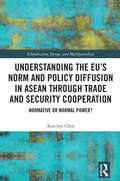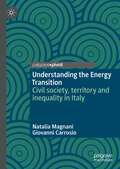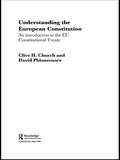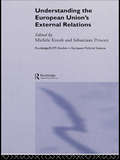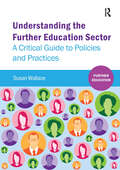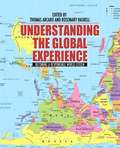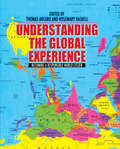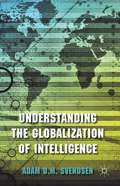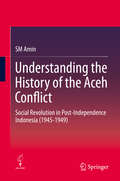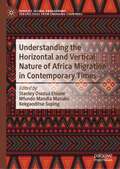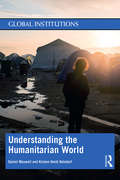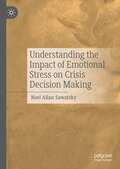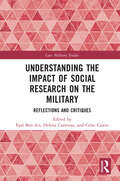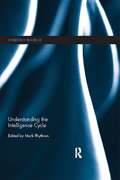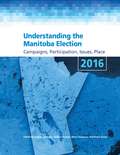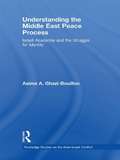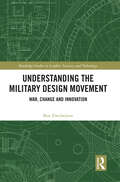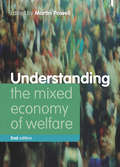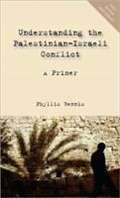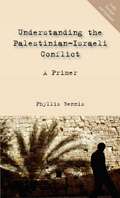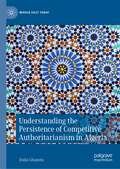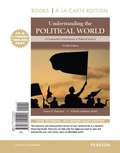- Table View
- List View
Understanding the EU’s Norm and Policy Diffusion in ASEAN through Trade and Security Cooperation: Normative or Normal Power? (Globalisation, Europe, and Multilateralism)
by Xuechen ChenThis book examines the European Union’s (EU’s) norm and policy diffusion in relation to the Association of Southeast Asian Nations (ASEAN). By looking at the EU’ engagement with ASEAN in trade and non-traditional security, the book analyzes the drivers, processes, and effectiveness of the EU’s norm and policy diffusion in ASEAN and explains the EU’s foreign policy and power projection in the context of its relationship with ASEAN. In doing so, it helps to advance knowledge about the EU’ external relations and power projection in relation to regional political entities beyond its immediate borders and affords firsthand empirical material on how the EU’s power in global politics is impacted by external perceptions and responses in different policy fields. This book will be of key interest to scholars, students, and practitioners of EU foreign policy, EU–SEAN relations, and ASEAN politics and more broadly to European Studies, Comparative Regionalism, Asian Studies, and International Relations
Understanding the Energy Transition: Civil society, territory and inequality in Italy
by Natalia Magnani Giovanni CarrosioThe transformation of the dominant model of centralized energy production from fossil fuels to renewable energies is at the center of the public and scientific debate, as well as the subject of national and European policies, as it is connected to highly topical issues such as climate change, emissions reduction and natural disasters, security of supply and sustainability of the current economic development model.Up to now this topic has been mainly addressed by the economic and engineering sciences, with a research focus on the hardware rather than on the human and social software.However, energy systems, and the possibilities of change, are not only economic or technological but involve also patterns of social life, representations, organizational models and relational structures. In order to generate the social preconditions for the transition to a low-emission society, focused on a growing production of energy from renewable sources and on a greater sustainability of consumption, it is therefore urgent to reaffirm the centrality of a sociological approach to energy.This book focused on three core research areas which are crucial to understand what is at stake with the energy transition: conflicts over the construction and location of renewable energy production plants; collective action on renewable sources that promote a new model of energy system in which consumers are also producers; and the social-territorial impact of energy policies.
Understanding the European Constitution: An Introduction to the EU Constitutional Treaty
by Clive H. Church David PhinnemoreThe European Union is now entering a crucial phase as the ratification process accelerates and key debates and referenda take place in existing and potentially new member states. The Union’s Constitutional treaty is often cast as either a blueprint for a centralized and protectionist super-state or as the triumph of Anglo-Saxon economics. Yet it has been little read, particularly in the United Kingdom. This book puts this right by publishing the full text of the crucial first part of the document and showing that it does not justify either of the extreme interpretations imposed on it. Written by two experts of the treaties, Understanding the European Constitution sets the Constitutional Treaty in context, examining its main themes and content and considering the implications of any rejection. It does this in uncomplicated language and with the help of explanatory tables and a glossary. Those who wish to make a considered verdict on the basis of the facts will find it invaluable.
Understanding the European Union's External Relations (Routledge/ECPR Studies in European Political Science #No.29)
by Sebastiaan Princen Michèle KnodtThe European Union is one of the world's biggest economies. However, its role as an international actor is ambiguous and it's not always able to transform its political power into effective external policies. The development of an 'assertive' European Union challenges the image of an internal project aimed at economic integration and international relations theories based on unitary state actors. This book systematically links the EU's external relations to existing political theories, showing how existing theories need to be modified in order to deal with specific characteristics of the EU as an international actor.
Understanding the Further Education Sector: A critical guide to policies and practices (Further Education)
by Susan WallaceThose working towards QTLS are required to demonstrate a critical understanding of the Further Education (FE) sector and the role of the FE practitioner. This book clearly identifies, particularly for the student teacher with no prior experience, the social, cultural and political context of the sector’s beginnings and explores how this continues to shape and constrain the sector’s status and purpose, and the role and status of its teachers. The text encourages critical thinking about possible routes for change and future development. As increasing numbers of QTLS students are being encouraged to gain part of their qualification at M level, the need for an accessible and critical sourcebook about the FE sector, such as this, is essential.
Understanding the Global Experience: Becoming a Responsible World Citizen
by Anthony Weston Thomas Arcaro Mathew Gendle Duane Mcclearn Laura Roselle Jean Schwind Kerstin Sorensen Rosemary Haskell Jeffrey C. Pugh Robert G. Anderson Ann J. Cahill Chinedu Ocek" Eke Lawrence A. Basirico Jeffrey Pugh Anne Bolin Stephen Braye Ann Cahill Brian Digre Ocek EkeThis cross-disciplinary anthology of contemporary global issues explores a number of topics and methodologies critical to developing responsible world citizenship. Globalism, Globalization, Culture, Environmentalism, Western Imperialism, Global Media and News; Global Media and News. For anyone wishing to better understand globalization and its impact.
Understanding the Global Experience: Becoming a Responsible World Citizen
by Anthony Weston Robert Anderson Thomas Arcaro Mathew Gendle Laura Roselle Jean Schwind Kerstin Sorensen Rosemary Haskell Jeffrey Pugh Anne Bolin Stephen Braye Ann Cahill Brian Digre Chinedu Eke Duane McClearnFirst Published in 2016. Routledge is an imprint of Taylor & Francis, an Informa company.
Understanding the Globalization of Intelligence
by Adam D.M. SvendsenThis book provides an introduction to the complexities of contemporary Western Intelligence and its dynamics during an era of globalization. Towards an understanding of the globalization of intelligence process, Svendsen focuses on the secretive phenomenon of international or foreign intelligence cooperation ('liaison'), as it occurs in both theory and practice. Reflecting a complex coexistence plurality of several different and overlapping concepts in action, the challenging process of the globalization of intelligence emerges as: essential for complex issue management purposes during a globalized era characterized by transnational terror, crises (man-made and natural), and organized crime; while simultaneously raising several valid accountability and oversight concerns, including proportionality questions. The book spans several bodies of literature in a connective and exploratory manner offering an interdisciplinary and comprehensive analytical framework on a topical theme.
Understanding the History of the Aceh Conflict: Social Revolution in Post-Independence Indonesia (1945-1949)
by SM AminThis book is the first English translation of the original text Atjeh Sepintas Lalu published in 1950 in Bahasa Indonesia by one of Indonesia’s leading lawyers, writers, and political figures, examining the history of the continuously turbulent Aceh. The book describes the legal and political situation in Aceh between 1945 and 1949, considering the events and incidents that related to the government, judiciary, civil servants, and life of the parties at the time. It unpacks the dispute between two major streams of thoughts that cut across the people of Aceh during that era – one based on religious teachings, and the other on secular principles. What followed was the unavoidable emergence of disparate groups, which, in turn, yielded conflict. The author, as a former insider in the Aceh government, was able to uncover the 'inside story' on the ground, in analyzing and discussing this fragment of the history of Aceh. A unique resource, this translation – presented six decades after it was first made available – is still invaluable today, allowing readers to interpret the events that occurred in Aceh at the time in the context of an understanding of Aceh’s development today. This book will be of keen interest to specialists in Islamic law, regionalism, historians of Indonesia, as well as social scientists interested in the early post-independence history of Indonesia.
Understanding the Horizontal and Vertical Nature of Africa Migration in Contemporary Times (Africa's Global Engagement: Perspectives from Emerging Countries)
by Mfundo Mandla Masuku Stanley Osezua Ehiane Kekgaoditse SupingThe book project strives to establish and interpret the experiences and realities of African migration using African epistemology and philosophy. The significance of this book is triggered by an observation that seeks to propound the Eurocentric paradigm as not being the only dominating, acceptable, or legitimate approach to knowledge in explaining the evolution and dynamics of African migration. Africans have a long history of migration, both involuntary and voluntary. Contemporary African migrants have experienced three (3) types of migration, namely labour migration, forced migration or refugee movement, and skilled professional migration. These types of migration take place within the continent and between Africa and other continents. The book seeks to explore and cover a wide array of issues experienced by contemporary African migrants. This includes, but is not limited to, what and who a contemporary African migrant is; factors that influence contemporary African migration; the role and impact of regional institutions and other transnational entities on contemporary African migration; the challenges of contemporary African migrants; the impact of contemporary African migrants in national, regional, international politics and economy; the role of a contemporary African migrant on regional integration.
Understanding the Humanitarian World (Global Institutions)
by Daniel G Maxwell Kirsten GelsdorfConflict and disaster have been part of human history for as long as it has been recorded. Over time, more mechanisms for responding to crises have developed and become more systematized. Today a large and complex ‘global humanitarian response system’ made up of a multitude of local, national and international actors carries out a wide variety of responses. Understanding this intricate system, and the forces that shape it, are the core focus of this book. Daniel G Maxwell and Kirsten Gelsdorf highlight the origins, growth, and specific challenges to, humanitarian action and examine why the contemporary system functions as it does. They outline the main actors, explore how they are organised and look at the ways they plan and carry out their operations. Interrogating major contemporary debates and controversies in the humanitarian system, and the reasons why actions undertaken in its name remain the subject of so much controversy, they provide an important overview of the contemporary humanitarian system and the ways it may develop in the future. This book offers a nuanced understanding of the way humanitarian action operates in the 21st century. It will be essential reading for anyone with an interest in international human rights law, disaster management and international relations.
Understanding the Impact of Emotional Stress on Crisis Decision Making
by Noel Allan SawatzkyMotivational models are critical to understanding crisis decision making because leaders and their advisors are emotionally involved, intent on reducing stress, and motivated to find ways of advancing their interests while minimizing the risk of war. The principal theoretical work on the subject is Irving Janis and Leon Mann’s classic study of decision making, published in 1977. While useful, the book has a significant flaw: Janis and Mann theorize that policy maker stress during crisis is derived from decision deliberation, leading to a circular approach. This book solves the identified problem by addressing circularity between the rise of psychological stress, decision deliberation, and dysfunctional behavior with an independent measure of decision conditions using cognitive complexity. With an effective independent measure of stress, the key contribution of this volume is a reformulation of Janis and Mann’s model to render the construct more rigorous and empirically useful to the present-day study of crisis decision making.
Understanding the Impact of Social Research on the Military: Reflections and Critiques (Cass Military Studies)
by Eyal Ben-AriThis book seeks to chart and evaluate the impact of social research on the military itself. By ‘impact’, the authors in this volume simply mean that which has a marked effect or influence on changing military policy, practices, knowledge, skills, behaviour, or living conditions. The book comprises a series of reflective contributions from scholars who have conducted research on the military as external scholars with no formal ties to the armed forces, as 'native' researchers formally linked to them, as well as various kinds of contracted social scientists enabled by the military to carry out their investigations. The authors were asked to make the question of the impact of social scientific research on the armed forces an object of study in itself and to situate their reflections in terms of wider analytical questions. As a result, the chapters can be divided, broadly speaking, into two types of orientation: some are centered on theoretical and analytical issues, while others focus on the researchers’ lived experiences. This book will be of interest to students of military studies, sociology, organisational studies, psychology and political science.
Understanding the Impacts of Deregulation in Planning: Turning Offices into Homes?
by Jessica Ferm Nicola Livingstone Ben Clifford Patricia CanelasIn England, it has been possible since 2013 to convert an office building into residential use without needing planning permission (as has been required since 1948). This book explores the consequences of this central government driven deregulation on local communities. The policy decision was primarily about boosting the supply of housing, but reflects a broader neoliberal ideology which seeks to reform public planning in many countries to reduce perceived interference in free markets. Drawing on original research in the English local authorities of Camden, Croydon, Leeds, Leicester and Reading, the book provides a case study of the implementation of planning deregulation which demonstrates the lowering of standards in housing quality, the reduced ability of the local state to proactively steer development and plan for their places, and the transfer of wealth from the public to private spheres that has resulted. Comparative case studies from Glasgow and Rotterdam call into question the very need for the deregulation in the first place.
Understanding the Intelligence Cycle (Studies in Intelligence)
by Mark PhythianThis book critically analyses the concept of the intelligence cycle, highlighting the nature and extent of its limitations and proposing alternative ways of conceptualising the intelligence process. The concept of the intelligence cycle has been central to the study of intelligence. As Intelligence Studies has established itself as a distinctive branch of Political Science, it has generated its own foundational literature, within which the intelligence cycle has constituted a vital thread - one running through all social-science approaches to the study of intelligence and constituting a staple of professional training courses. However, there is a growing acceptance that the concept neither accurately reflects the intelligence process nor accommodates important elements of it, such as covert action, counter-intelligence and oversight. Bringing together key authors in the field, the book considers these questions across a number of contexts: in relation to intelligence as a general concept, military intelligence, corporate/private sector intelligence and policing and criminal intelligence. A number of the contributions also go beyond discussion of the limitations of the cycle concept to propose alternative conceptualisations of the intelligence process. What emerges is a plurality of approaches that seek to advance the debate and, as a consequence, Intelligence Studies itself. This book will be of great interest to students of intelligence studies, strategic studies, criminology and policing, security studies and IR in general, as well as to practitioners in the field.
Understanding the Manitoba Election 2016: Campaigns, Participation, Issues, Place
by Andrew Taylor Daniel Heidt Whitney LackenbauerIn "Two Years Below the Horn," engineer Andrew Taylor vividly recounts his experiences and accomplishments during Operation Tabarin, a landmark British expedition to Antarctica to establish sovereignty and conduct science during the Second World War. When mental strain led the operation’s first commander to resign, Taylor—a military engineer with extensive prewar surveying experience—became the first and only Canadian to lead an Antarctic expedition. As commander of the operation, Taylor oversaw construction of the first permanent base on the Antarctic continent at Hope Bay. From there, he led four-man teams on two epic sledging journeys around James Ross Island,overcoming arduous conditions and correcting cartographic mistakes made by previous explorers. The editors’ detailed afterword draws on Taylor’s extensive personal papers to highlight Taylor’s achievements and document his significant contributions to polar science. This book will appeal to readers interested in the history of polar exploration, science, and sovereignty. It also sheds light on the little known contribution of a Canadian to a distant theatre of the Second World War. The wartime service of Major Taylor reveals important new details about a groundbreaking operation that laid the foundation for the British Antarctic Survey and marked a critical moment in the transition from the heroic to the modern scientific era in polar exploration.
Understanding the Middle East Peace Process: Israeli Academia and the Struggle for Identity (Routledge Studies on the Arab-Israeli Conflict)
by Asima Ghazi-BouillonTracing the evolution of the Israeli academic debate over history, politics, and collective identity, Understanding the Middle East Peace Process examines the Middle East peace process since Oslo and follows the discursive struggle over Israeli collective identity. Based on interviews with key protagonists, this book gives a detailed analysis of the interrelatedness of academic debate, societal discourse, and collective identity against the background of major political events in Israel. It charts the ascendancy and expansion of post-Zionism, outlines the emergence of neo-Zionism from the political right, and the re-appropriation of Zionism in light of the new political climate of peace-making. Ghazi-Bouillon provides a new perspective on the failure of the New Historians to revolutionize Israeli intellectual life and the failure of post-Zionism to revolutionize Israeli political life, whilst assessing neo-Zionism’s potential to do both.
Understanding the Military Design Movement: War, Change and Innovation (Routledge Studies in Conflict, Security and Technology)
by Ben ZweibelsonThis book explains the history and development of the military design movement, featuring case studies from key modern militaries. Written by a practitioner, the work shows how modern militaries think and arrange actions in time and space for security affairs, and why designers are disrupting, challenging, and reconceptualizing everything previously upheld as sacred on the battlefield. It is the first book to thoroughly explain what military design is, where it came from, and how it works at deep, philosophically grounded levels, and why it is potentially the most controversial development in generations of war fighters. The work explains the tangled origins of commercial design and that of designing modern warfare, the rise of various design movements, and how today’s military forces largely hold to a Newtonian stylization built upon mimicry of natural science infused with earlier medieval and religious inspirations. Why does our species conceptualize war as such, and how do military institutions erect barriers that become so powerful that efforts to design further innovation require entirely novel constructs outside the orthodoxy? The book explains design stories from the Israel Defense Force, the US Army, the US Marine Corps, the Canadian Armed Forces, and the Australian Defence Force for the first time, and includes the theory, doctrine, organizational culture, and key actors involved. Ultimately, this book is about how small communities of practice are challenging the foundations of modern defence thinking. This book will be of much interest to students of military and strategic studies, defence studies, and security studies, as well as design educators and military professionals.
Understanding the Mixed Economy of Welfare (second edition)
by Martin PowellAs the state withdraws from welfare provision, the mixed economy of welfare – involving private, voluntary and informal sectors – has become ever more important. This second edition of Powell’s acclaimed textbook on the subject brings together a wealth of respected contributors. New features of this revised edition include: • An updated perspective on the mixed economy of welfare (MEW) and social division of welfare (SDW) in the context of UK Coalition and Conservative governments • A conceptual framework that links the MEW and SDW with debates on topics of major current interest such as ‘Open Public Services’, ‘Big Society’, Any Qualified Provider’, Private Finance Initiative (PFI) and ‘Public Private Partnerships’ (PPP) Containing helpful features such as summaries, questions for discussion, further reading suggestions and electronic resources, this will be a valuable introductory resource for students of social policy, social welfare and social work at both undergraduate and postgraduate level.
Understanding the Modern Russian Police
by Olga B. Semukhina Kenneth Michael ReynoldsUnderstanding the Modern Russian Police represents the culmination of ten years of research and an ongoing partnership between the Volgograd Academy of Russian Internal Affairs Ministry (VA MVD) and the Volgograd branch of the Russian Presidential Academy of National Economy and Public Administration (VAPA). The book provides a timely and comprehen
Understanding the Palestinian-Israeli Conflict: A Primer
by Phyllis Bennis"Why is there so much violence in the Middle East?" "Who are the Palestinians?" "What are the occupied territories?" "What does Israel want?" With straightforward language, Phyllis Bennis, longtime analyst of the region, answers basic questions about Israel and Israelis, Palestine and Palestinians, the US and the Middle East, Zionism and anti-Semitism; about complex issues ranging from the Oslo peace process to the election of Hamas. Her answers point the way toward a comprehensive understanding of the longstanding Palestinian--Israeli conflict.
Understanding the Palestinian-Israeli Conflict: A Primer
by Phyllis BennisIf you have ever wondered "Why is there so much violence in the Middle East?", "Who are the Palestinians?", "What are the occupied territories?" or "What does Israel want?", then this is the book for you. With straightforward language, Phyllis Bennis, longtime analyst of the region, answers basic questions about Israel and Israelis, Palestine and Palestinians, the US and the Middle East, Zionism and anti-Semitism; about complex issues ranging from the Oslo peace process to the election of Hamas to the Goldstone Report and the Palestinians' UN initiative. Together her answers provide a comprehensive understanding of the longstanding Palestinian-Israeli conflict.Sections include: The Crisis; The Other Players: The Role of the US, the UN, the Arab States, and Europe; Recent History: Rising Violence; Looking Backward (1900-1991); The Future.
Understanding the Persistence of Competitive Authoritarianism in Algeria (Middle East Today)
by Dalia GhanemThis book unravels the secrets behind the Algerian regime’s survival and the pillars of its longevity. How did authoritarian consolidation happen, and why is it likely to continue despite Bouteflika’s departure and the emergence of a new actor: the popular movement, Hirak. The author sheds light on the pillars behind the durability of Algeria’s regime. The latter has demonstrated an extraordinary capacity to perpetuate itself through an array of mechanisms. It identifies Algeria’s authoritarianism as a distinctly competitive and adaptable kind, which has better allowed the regime to persist in the face of all manner of change. The book analyzes Algeria’s situation and the regime persistence far from the premise of a trend towards democratization. The project also contributes to a broader area of study concerned with “competitive authoritarianism,” regimes that face domestic resistance, the question of what and how compels such regimes to change, the nature of their political institutions, and more.
Understanding the Political Philosophers: From Ancient to Modern Times
by Alan HaworthUnderstanding the Political Philosophers is an absorbing and accessible introduction to the major philosophers and core texts of western political philosophy. Organised historically - beginning with Socrates and Plato, and concluding with post-Rawlsian theory - Alan Haworth presents the key ideas and developments with clarity and depth. Each chapter provides a concentrated study of a given thinker or group of thinkers and together they constitute a broad account of the main arguments in political philosophy. There are chapters on Socrates, Plato, Aristotle, Hobbes, Locke, Rousseau, the Utilitarians, Marx, and Rawls’s early work. This revised second edition has been brought fully up-to-date, and includes expanded coverage of the period from the death of Aristotle to the sixteenth century, as well as a new chapter on Rawls’s later philosophy and the direction of post-Rawlsian philosophy. Including a chronology and suggestions for further reading, Understanding the Political Philosophers is an ideal introductory text for students taking courses in political philosophy or political theory.
Understanding the Political World: A Comparative Introduction to Political Science (Twelfth Edition)
by Charles Anthony Smith James N. DanzigerPresenting key concepts, relevant research findings, and detailed explanations, the Twelfth Edition offers readers a path to understanding the challenges of politics and political differences. The text explores the subject matter from a comprehensive and comparative standpoint, using real examples from different international political systems to demonstrate how politics are understood throughout the world.
